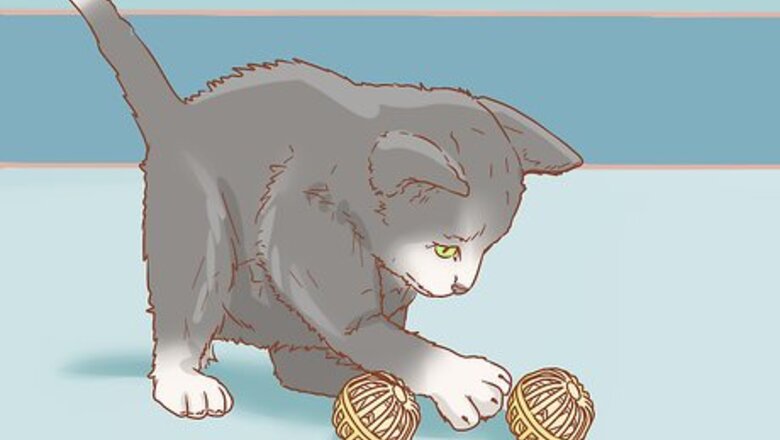
views
Tiring Out a Kitten
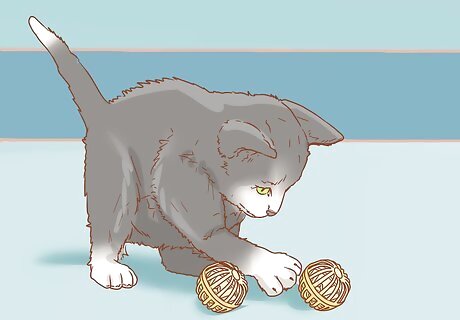
Play with hyper kittens. If a kitten is running around or batting at you, it doesn't want to sleep. Tire the kitten out by making it chase a string, feathers, ribbon, or other cat toy. Moving up and down will tire the kitten out sooner. Try making it run up and down stairs, or across a plastic netting draped on the back of a sturdy chair.
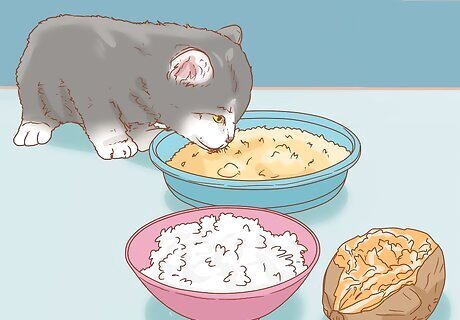
Feed the kitten warm food. Schedule one of the kitten's feeding sessions right before bedtime, since a full belly will help it feel sleepy. For best results, heat the food to a warm, but not hot, temperature. Placing a closed container of food in a pan of hot water should accomplish this safely. If you microwave the food, stir it thoroughly to mix in hot spots. You might be able to make the kitten sleepier by mixing in a small amount of carbohydrate-rich food, such as cooked rice or sweet potato. Also make sure the kitten has constant access to water.
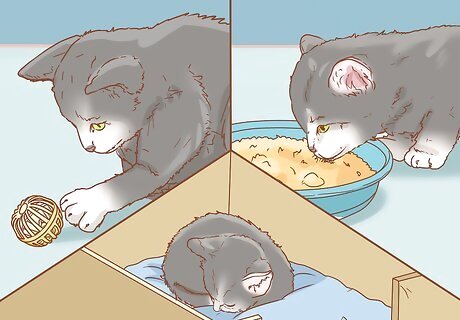
Encourage a regular energy cycle. Feed the kittens and encourage them to sleep at the same times each day. Newborn kittens are on a much shorter cycle and require feeding every two or three hours, but after about four weeks old this can gradually change to a more convenient schedule. Try to play with your kitten to tire it out right before it eats. Since playing simulates hunting, your kitten is more likely to eat and then sleep right after.
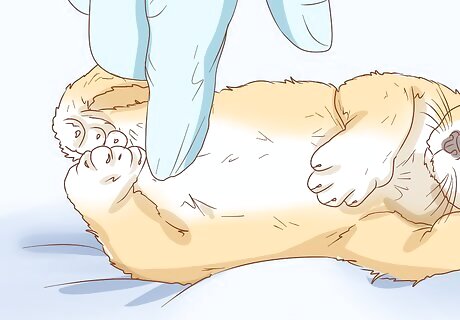
Make sure the kitten has no bowel or urinary problems. Constipation can be a serious, even life-threatening condition for young kittens, and may be a source of discomfort preventing the cat from sleeping. If a young kitten has not eliminated urine or feces within the last 12 hours, take it to a veterinarian immediately. Newborn kittens (under four weeks) without a mother cat need to have their genitalia rubbed with a warm, wet washcloth after each meal. Rub gently in one direction only, and continue until the urine flow has stopped.
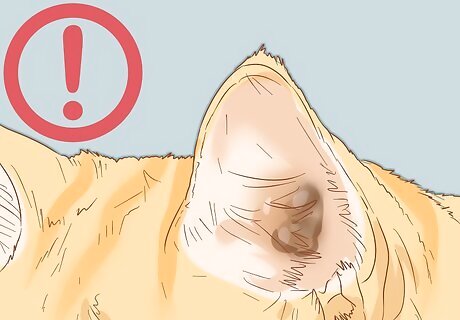
Check for other health problems. If a kitten has all the necessities it needs, but is still mewing or refusing to sleep, it might be kept awake by itching or pain. Check the ears for mites and the fur for fleas, and treat these with kitten-safe medication if present. Consult a veterinarian if the kitten is uncomfortable for no apparent cause, or if you discover a more serious medical issue.
Setting Up a Bed and Living Space for Kittens
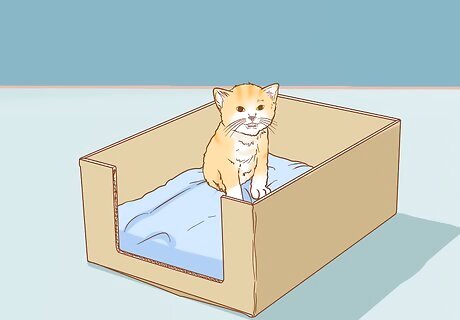
Make a warm, soft bed. Create a soft, cozy bed for the kittens, large enough to include the mother cat if there is one. Use a soft blanket or towel to cover the base and sides of a box or basket. Leave the top of the bed uncovered, and make sure the kittens can leave and enter the bed themselves, unless they are not yet weaned.
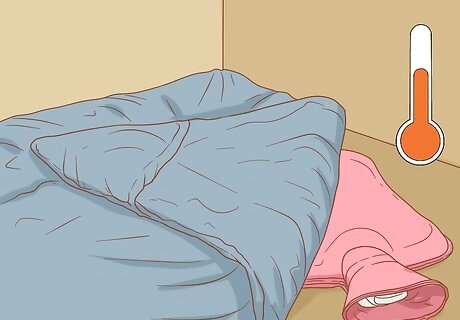
Make the bed extra warm. Place a warm, but not hot, rubber water bottle or microwavable heat pad underneath the blanket. Kittens love warmth, and will usually fall asleep in a warm, enclosed space. You can also warm the towel or blanket over an electric space heater or in the dryer, just for a few minutes.
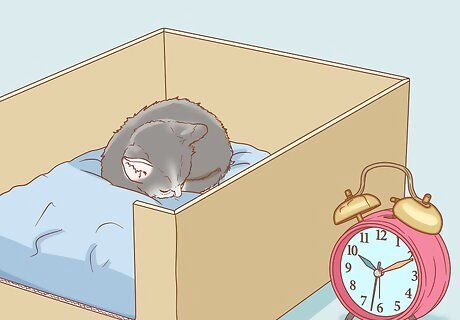
Put a comforting ticking sound in the bed. If the kittens do not have a mother, an object that produces a quiet, regular sound may help the kittens relax. An alarm clock or a kitchen timer next to the bed might work, but make sure there isn't a noisy alarm set to go off.
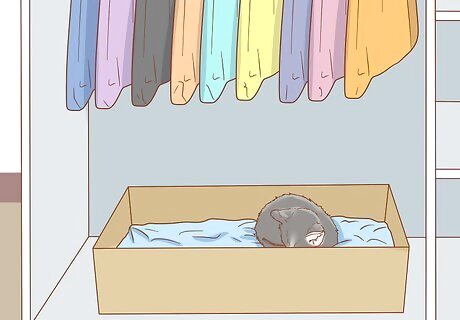
Keep the bed in a secure, warm area.This area can be a closet, a small room, or a fenced-off area of a room. Make sure other animals, besides the mother cat, do not have access to young kittens, and that all humans know not to step into the kitten area without watching the floor. Don't keep kittens in an attic, garage, or basement, since these areas can rapidly become too cold or too hot.
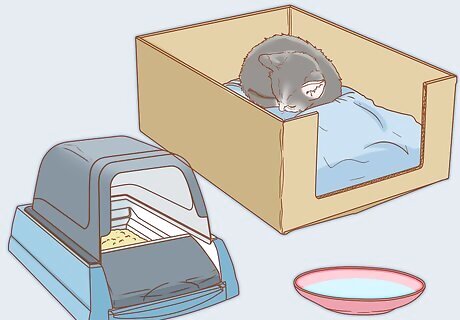
Provide the kittens with other necessities. Near the bed, the kittens should have access to water, a litterbox, and toys. If the kittens have access to food around the clock, place the food dish in this area as well. Empty the litterbox regularly, or the kittens may not wish to sleep there — or they may use their bed instead.
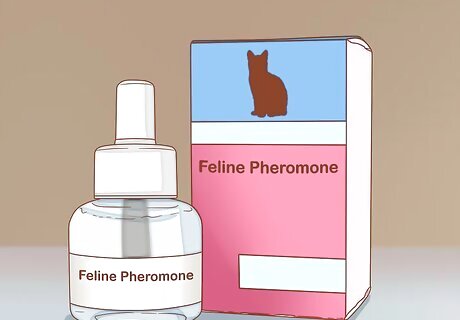
Try a cat pheromone spray. Cat pheromone products mimic the natural, calming chemicals cats produce when they rub their face on objects. This may be useful if the kitten won't sleep in its bed, or if a kitten old enough to be potty-trained still uses the bed as a litterbox. Spray the pheromones on the kittens' bed, never on the kitten directly, and allow 20 minutes for it to dry before you allow the cat access to it.

Keep the area quiet. While the kittens are in bed, move conversations and television elsewhere. Some kittens find gentle music relaxing, but in many cases complete silence is more effective.
Petting a Kitten Until it Sleeps

Hold the kitten securely in your arms or lap. Put a blanket over your lap so you can slide the kitten off once it's fallen asleep. Gently pick up the kitten and encircle it with your arms, making a warm, enclosed space. You can place young kittens under your sweater, or under a second light blanket. This might be enough to send them to sleep by itself. If the kitten won't stay in your lap, read the tips in the section on hyper kittens first. If the kitten is leaving because it is uncomfortable around you, don't force it to stay.
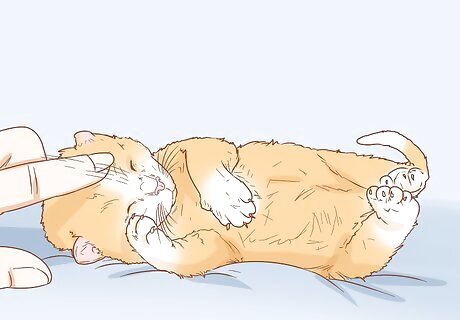
Stroke the cat's nose and forehead. Starting about halfway up the bridge of the nose, stroke the kitten's nose upward with one finger. Move up to the top of the kitten's forehead, then lift your finger and repeat again from the nose. The kitten should reflexively blink or close its eyes while you do this, encouraging it to fall asleep.
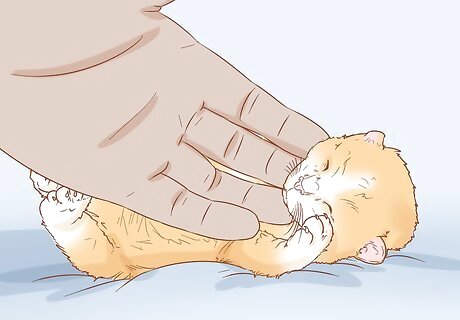
Pet the kitten elsewhere. Different kittens have different preferred petting areas, but there are plenty of common places you can try. Stroking the forehead usually calms cats, as does rubbing under the chin or the top of the neck. When getting a cat to sleep, always stroke the fur in the direction it lies, repeating the same motion slowly. Some kittens like their front paws gently massaged, but this area is too sensitive for some others. Try it, but let the kitten pull away if he doesn't like it.
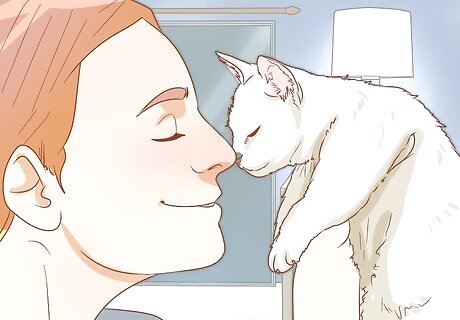
Blink at the kitten. Move your face near the kitten and blink or close your eyes. If the kitten is watching you, it might respond the same way. Yawning might also work, but keep your face a bit further away to avoid scaring the kitten.
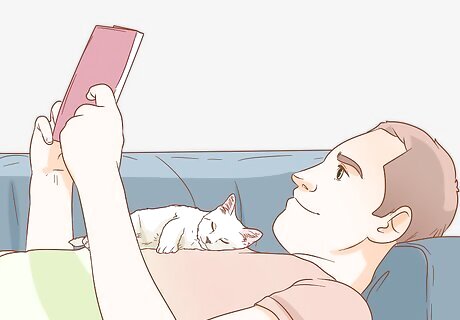
Relax and breathe deeply. Once the kitten is dozing off, read a book or find some other quiet activity. Breathe deeply and slowly, since kittens can pick up on this sign of calm. If the kitten keeps squirming, you can try blowing onto the kitten's back on the exhale, or holding it near your chest so it feels your heartbeat.
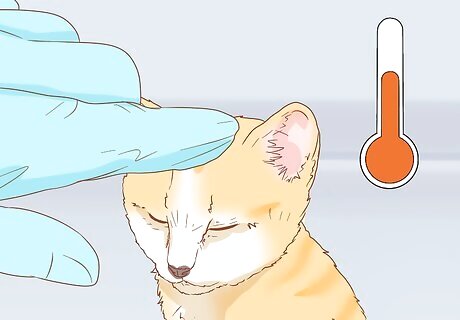
Wipe the kitten's face with a warm, damp cloth. Choose a cloth with a slightly rough weave, but rub gently. Wipe the kitten's cheeks, forehead, and bridge of the nose. This mimics the mother cat licking the kitten's face, and may make it more comfortable.



















Comments
0 comment